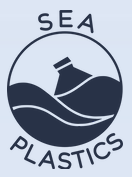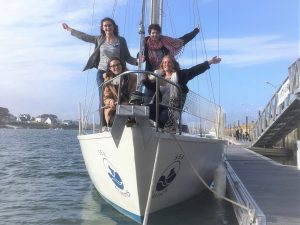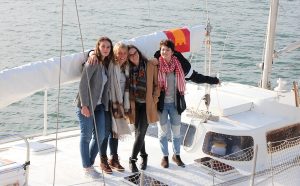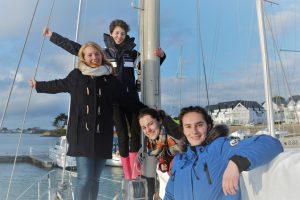 Founded in 2016 by three students from AgroParisTech, a school of engineering in life sciences and the environment, Sea Plastics is an association whose mission is to design and operate oceanographic expeditions to study the impact of plastics on the marine environment.
Founded in 2016 by three students from AgroParisTech, a school of engineering in life sciences and the environment, Sea Plastics is an association whose mission is to design and operate oceanographic expeditions to study the impact of plastics on the marine environment.
The values of Sea Plastics are the protection of the environment through research, sharing of experiences with the public, team spirit, and sports challenges.

The SEA PLASTICS 2018 expedition (from April to the end of July, 2018), contributes to research on plastic pollution in the oceans through partnerships with recognized institutions and laboratories. Regular meetings with the public will take place during the expedition to raise awareness, inform and bring out innovative solutions, including participatory science.
Mercator Ocean is a partner of the Sea Plastics expedition and provides expertise and oceanographic products useful for the expedition. Mercator Ocean’s expertise applied to the Copernicus Marine Service products allows the crew to use oceanographic forecast information transmitted through a router to locate eddies.
Additional Information on Sea Plastics:
The project entitled “Expedition 2018: the impact of plastic on life, from bacteria to whales” consists of studying plastic waste in three areas of the western Mediterranean Sea (Balearic Islands, Corsica-Sardinia, and Italian Riviera).
From April 11, 2018, the objective is to go to these areas with the sailboat “Labo” to:
 (1) study the vertical distribution of microplastics and nanoplastics according to a protocol tested during the 2017 expedition; (2) use CNES’s Gyroplastic buoy to determine in real-time the quantities of plastics and surface plankton, (3) and (4) to follow the behavior of cetaceans by acoustics, and to follow elasmobranchs in areas of plastic concentration with a protocol and photo-identification used for tracking sharks and rays, (5) to analyze microorganisms developing with microplastics (sequencing DNA study in functional genetics).
(1) study the vertical distribution of microplastics and nanoplastics according to a protocol tested during the 2017 expedition; (2) use CNES’s Gyroplastic buoy to determine in real-time the quantities of plastics and surface plankton, (3) and (4) to follow the behavior of cetaceans by acoustics, and to follow elasmobranchs in areas of plastic concentration with a protocol and photo-identification used for tracking sharks and rays, (5) to analyze microorganisms developing with microplastics (sequencing DNA study in functional genetics).
Maps made from the Copernicus Marine Service catalogue will be provided to the team by Mercator Ocean and used for routing and comparison of data in areas with converging currents. Also, current animations and particle drift simulations will be presented to the public during the ship stopovers.


